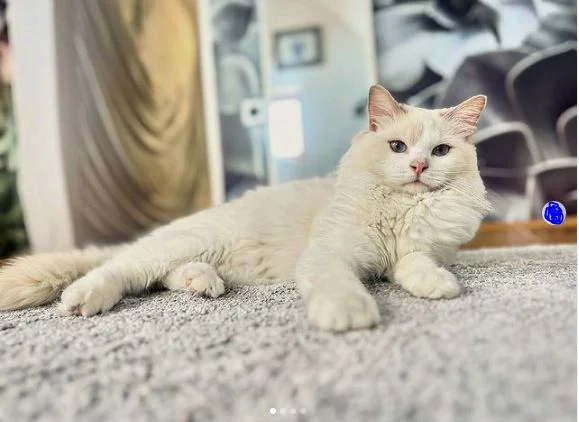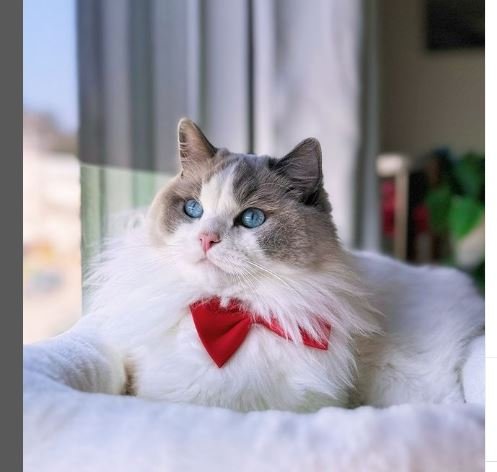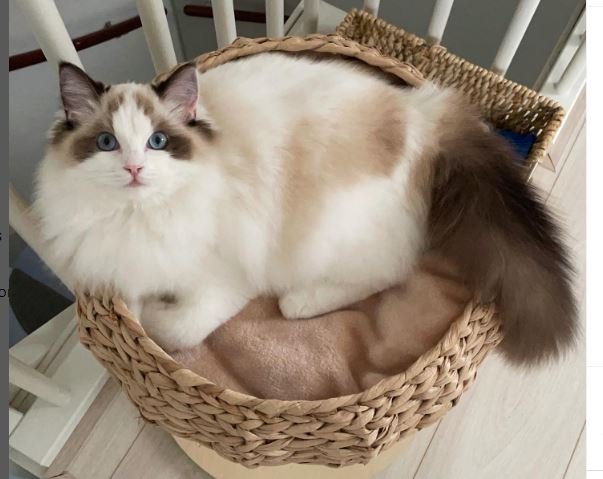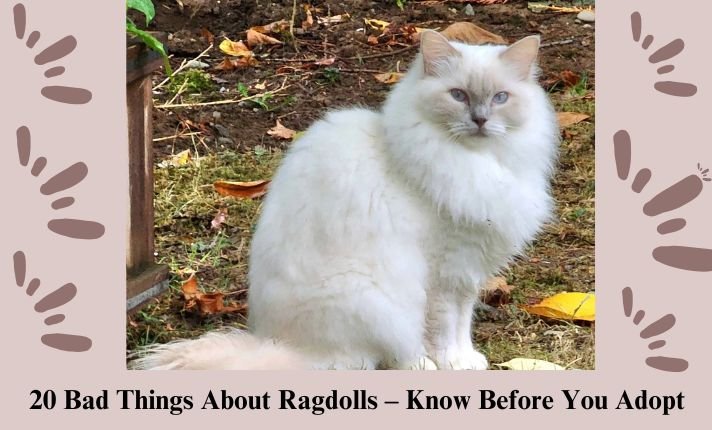Ragdolls are often adored for their beautiful blue eyes, soft coats, and relaxed demeanor. They’re known to be affectionate and friendly, but they’re not always the perfect match for everyone. Like every breed, Ragdolls have their challenges.
If you’re considering adopting a Ragdoll, it’s crucial to know the potential downsides so you can be prepared. Below, we discuss 20 important things about Ragdolls that you should think about before bringing one home.
Bad Things About Ragdolls
1. They are Expensive:
Ragdolls are one of the more expensive cat breeds to buy, ranging from $800 to $2,000. The cost depends on the breeder and the cat’s lineage. This price doesn’t include other expenses like vaccinations, spaying or neutering, and check-ups. Finding a reputable breeder is crucial to ensure you get a healthy kitten. The cost can be even higher for show-quality cats or those with specific desirable traits.
2. Common Health Issues:
Ragdolls are generally healthy cats but have a genetic predisposition to some health issues. One of the most concerning is Hypertrophic Cardiomyopathy (HCM), a heart condition. They are also more prone to urinary tract issues and obesity if their diet isn’t carefully monitored. Regular vet check-ups are essential to catch any signs of HCM early.
3. They Need High Maintenance Grooming:
Ragdolls have long, silky fur that requires regular grooming. Their thick coats shed quite a bit, and if not properly maintained, their fur can become matted. You’ll need to brush your Ragdoll two to three times a week to keep their coat healthy and prevent hairballs, which can be uncomfortable for your cat. Grooming helps to avoid tangles, knots, and skin irritation.
If grooming is neglected, it can lead to serious matting that may require a professional groomer to fix, which adds to the maintenance cost.

4. They Are Extremely Dependent Nature
Ragdolls are very affectionate and love being around people, but this also means they are very needy. They do not like being alone for long periods and can become anxious if left by themselves too often. If you work long hours or travel frequently, a Ragdoll may not fit you best. They do best in homes where someone is around for most of the day. They might need a companion pet if you are away often.
5. They Are Not Suitable for Busy Owners
Ragdolls need a lot of attention and interaction. They enjoy being with their owners and may follow you around the house. They can become bored or even destructive if you are too busy to spend quality time with them. They are not a good match for someone with a very hectic lifestyle. They need playtime, attention, and care every day to stay happy. Without it, they can become lonely and stressed.
6. Vulnerable Due to Lack of Defensiveness
Ragdolls are very trusting and lack the defensive instincts of other cat breeds. They are not very good at protecting themselves from potential threats, which makes them vulnerable outdoors. This makes it risky to let them roam outside, as they may not be able to defend themselves from other animals or dangers. They are better suited to being indoor-only cats where they are safe from harm. Their trusting nature means they rely on you for protection.

7. Shedding and Allergies
Ragdolls shed a lot, which can be a problem for people with allergies. Unlike some other breeds, they are not hypoallergenic. The proteins in their saliva and the fur they shed can trigger allergic reactions. Frequent grooming and vacuuming can help manage the shedding but won’t eliminate allergens.
8. Hyperactive Kittens
Ragdoll kittens are very active and full of energy, which can be surprising if you’re expecting a calm pet. They need plenty of toys and interaction to stay occupied. This playful phase can last for the first couple of years of their life. Without enough stimulation, they can get into trouble or damage household items. Providing safe play areas and lots of toys can help keep them entertained. They do calm down as they grow older.
9. Large Size and Space Requirements
Ragdolls are large cats, with males sometimes weighing over 20 pounds. Their size can be intimidating and they need plenty of space to move around. Their weight also means they may scratch or damage furniture when they jump. You may need sturdy furniture and scratching posts to accommodate them. Their size also means they eat more than smaller cats, which can increase the cost of food. They need a home with enough room to move comfortably.
10. Not Always a Lap Cat
While Ragdolls are affectionate, they don’t always want to sit on your lap. Some prefer to be nearby but not necessarily held or cuddled. Their affectionate nature doesn’t mean they want constant physical contact. If you’re looking for a cat that always wants to snuggle, a Ragdoll may not be the best fit. They often prefer lying beside you rather than on you. Their personality varies, and not all Ragdolls are lap cats.
11. Issues with Backyard Breeders
Ragdolls are very popular, which means that many unethical breeders are trying to profit from their demand. Backyard breeders often do not conduct the necessary health tests, which can result in kittens with serious health problems. It’s important to choose a reputable breeder who tests for genetic issues like HCM.

12. They Like an Indoor-Only Lifestyle
Ragdolls are best kept as indoor cats because of their trusting nature. They are not street-smart and can easily get into danger outdoors. If you decide to keep them indoors, you need to make the environment engaging to prevent boredom. Providing toys, climbing structures, and interactive games is important. They enjoy looking out windows, so having a spot where they can safely observe outside can help keep them happy.
13. They Are Prone to Separation Anxiety
Ragdolls can become very attached to their owners, which means they can suffer from separation anxiety if left alone for too long. They may start meowing loudly, become destructive, or stop eating if they feel lonely.
14. They are Picky About Litter Boxes
Ragdolls can be particular about their litter boxes and may refuse to use them if they are not cleaned often. They may also have preferences about the type of litter used. Keeping their litter box clean and in a quiet, accessible location is important to avoid any issues. If they become unhappy with their litter box, they may start going outside the box.
They Are Not Ideal For Young Children
Ragdolls are gentle cats, which means they can easily get hurt if handled roughly by young children. They are not likely to scratch or bite to defend themselves, which can make them vulnerable. Households with very young children may not be ideal unless the children are taught how to handle the cat gently.
16. They can Sensitive to Loud Noises:
Ragdolls can be very sensitive to loud or sudden noises, which can make them anxious. Household sounds like vacuum cleaners or even loud music can make them uncomfortable. If your home tends to be noisy, a Ragdoll might struggle to adjust. Providing them with a quiet place to retreat can help reduce their stress. It’s important to make sure they have a calm and peaceful environment where they can feel safe when things get too loud.
17. Long-Term Commitment
Ragdolls are known for their long lifespan, often living 15 years or more. While this is great for those who want a long-term companion, it also means a long-term responsibility. You need to be ready to provide for them for many years, including vet care, grooming, and daily attention. This commitment includes both time and financial resources.

18. High Veterinary Costs
Ragdolls are prone to certain health issues, which can lead to high vet bills. Regular check-ups are necessary, and some conditions may need ongoing treatment. Pet insurance can help cover these costs, but the monthly premiums can also be high. Dental care is another expense since Ragdolls can develop dental issues.
19. Hairball Problems
Because Ragdolls groom themselves a lot, they swallow a lot of fur, which can lead to hairballs. Hairballs can cause discomfort and may even lead to digestive issues. You can help reduce hairballs by grooming your Ragdoll often and giving them special food that helps hair pass through their system.
20. They are Lack of Independence:
Ragdolls are known for their affectionate and people-oriented nature. While this can be a positive trait for many owners, it also means that they may not do well when left alone for extended periods. Loneliness or boredom can lead to anxiety and behavioral issues.
Conclusion
Ragdolls are beautiful, loving cats, but they aren’t the right choice for everyone. They need a lot of attention, grooming, and special care, and they are prone to certain health problems. If you can handle the commitment, a Ragdoll can be a wonderful companion. However, if these challenges seem overwhelming, you might want to consider a breed that better suits your lifestyle. Always make sure you understand a breed fully before making a decision.

Hey guys, My name is Simon Smith. I’m from Canada and live near Victoria
I live with my sweet family and have 20+ Ragdolls of different types. I love them as my children. My profession is as a hotel manager.
I love to keep Ragdolls and grow their breeder case. I have 7 years of experience.
I’m an expert in cat care. So, I’m here to provide you with new information about my cats daily. This is my blog website, so I request that you kindly visit our site daily.
If you’re a Ragdolls lover and you have any questions or confusion about cats, text me on the Contact Us page or Gmail.
Thank u
